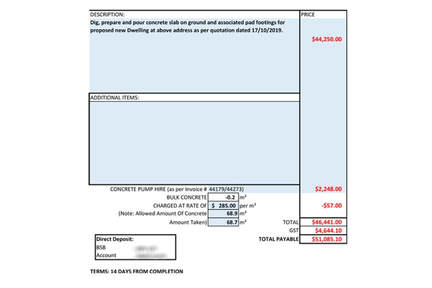|
Jane helps run the family building business, and in May she was arranging to pay $51,000 to a subcontractor. She'd worked with concreter Simon O'Donnell for almost a decade, making countless payments to him in that time. But a couple of days after Jane transferred the funds, Simon called her husband, asking where his money was. When Jane received the $51,000 invoice from Simon, she did notice his bank account had changed and updated his details before transferring the money. "We hadn't used Simon for six months so I thought he's possibly changed it over that period of time," Jane said. The email itself didn't seem unusual and it showed clear details of the job that'd been completed. But after looking at the email Simon sent, and the one Jane received, it was clear something was off. Simon's outbox shows he sent the invoice to Jane at 4:56pm on a Friday — but it didn't appear in her inbox until 7:30am on the Saturday. According to associate dean for computing and security at Edith Cowan University, associate professor Paul Haskell-Dowland, someone had gained access to either Simon or Jane's computer, and was waiting for an opportunity like this. Dr Haskell-Dowland believes hackers gained remote access by hacking the builder's website and surreptitiously redirecting visitors to another site which installed malicious software. The email would have been intercepted potentially via automated means and would have then been modified by human means," he said. Jane and Simon fell victim to a sophisticated business email compromise (BEC) scam. "I didn't know that an invoice could be intercepted between a supplier and ourselves and altered," Jane said. This is a story from ABC News on 24 November 2020. Read the full story Always check payment details before paying an invoiceRegrettably this kind of scam is fairly common and scammers regularly intercept invoices from suppliers and subcontractors and then change the banking details.
It pays to check the banking details on all invoices and confirm with the supplier or contractor that the details are correct. Scammers are getting more sophisticated and it's easy to be caught.
1 Comment
|
AuthorI’m a construction professional, author of several successful construction management books, and a home owner. I’ve made mistakes in construction management, I’ve seen others make mistakes, but importantly I’ve had multiple successful construction projects and I’ve learned from the mistakes. I want to share these lessons and my knowledge with you. Also available from:
Amazon Au, Amazon DE, Amazon ES, Amazon CA, Amazon IT, Amazon FR, Amazon NL, Amazon India and 'An Introduction to Building Houses - Volume 2 Finding Your Ideal Property and Designing Your Dream Home'
Archives
July 2024
CategoriesWe welcome genuine comments, especially comments that add additional information to the subject matter in the article. We however reserve the right to remove inappropriate comments, which includes comments that have nothing to do with the subject, comments that include inappropriate language, and comments that are an advertisement for a product or company, or which include an advertising link. Comments must be in English. We will not enter into discussion on why a particular comment was removed.
|



 RSS Feed
RSS Feed


